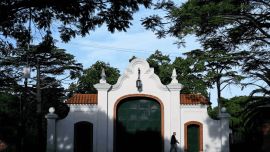Javier Milei has snubbed the Mercosur summit and will instead participate in a conservative forum this weekend in Brazil. With these showers of affection from his ideological peers, Argentina’s president is positioning himself as a global leader of the far right, but at what cost?
Since taking office in December, Milei has made eight trips abroad, mostly to the United States and Europe, where he met with few leaders and instead participated in religious or far-right events that usually see him presented with an award.But when the biannual summit of Mercosur presidents (Brazil, Argentina, Uruguay and Paraguay) is held next Monday in Asunción, the head of state will not be there.
The 53-year-old economist prefers a conservative conference at the weekend in Brazil, where he will coincide with Jair Bolsonaro, Brazil’s far-right ex-president and arch-rival of the snubbed current head of state, Luiz Inácio Lula Da Silva.
“It affects Argentina politically, because on several of these trips he meets with personalities or opposition politicians from the country he is visiting,” said Alejandro Frenkel, a political scientist at the National University of San Martín (UNSAM).
On these trips, the outspoken economist who has vowed to lead Argentina out of a deep crisis claims that the state is a “criminal organisation” and warns that “the West is in danger” from the “advance of socialism.”
His critics question him for his trips, which, they say, look more like private meetings than state affairs.
“I am worried about a President who goes around the world lecturing on how to save Argentina instead of applying the art of doing it here and now,” said opposition Unión Cívica Radical deputy Rodrigo de Loredo in Congress last week.
This is how his visit to Madrid in May to the convention of the far-right Vox party, where he was cheered like a rock star and ended up exchanging insults with Spanish Prime Minister Pedro Sánchez, was perceived.
These episodes have “an undeniable political effect,” Frenkel explained. “But it is not yet feasible to establish indicators that can mark whether the economic ties” between the two countries have also been affected.
However, he warned that “the Spanish business community has come out in support of the government.”
A crusader
“We are facing an attempt to fully restructure Argentina’s foreign policy,” said sociologist Juan Gabriel Tokatlián, a professor at Torcuato Di Tella University, at a seminar last month.
The President assigns religion an important place in foreign policy, “where dogma dictates policy,” he added.
“We are dealing with someone who has a reactionary way of thinking. A nostalgia for a supposedly magnificent past, he believes that the West is in danger,” said Tokatlián. Because of this, “between nostalgia and extremism, he has a tendency to be a crusader” rather than a strategist.
For Iván Schuliaquer, a political scientist at UNSAM, Milei’s foreign policy can also be explained by his view of the state, which he promises to destroy.
Milei declared in San Francisco back in June: “I love being the state’s mole; I am the one who destroys the state from the inside.”
Thus, “instead of using his institutional role to bring benefits to the country, he uses this role on an individual basis and around thinking of himself as a referential figure of what he calls ‘the ideas of freedom,’” said Schuliaquer. “His personal quarrels do not respond to Argentina’s strategic interests, but to his own vision of the world,” added the expert.
Provoked or not, Milei has traded insults with leftist leaders in the region, most recently with Brazil President Lula. During last year’s presidential campaign, Milei had disparaged his Brazilian counterpart and the regional Mercosur alliance. “The best example of a hindrance caused by the state is Mercosur,” he declared.
Brazil this week lamented the Argentine leader’s absence from the upcoming summit. “Argentina is already showing that Mercosur is not important for Milei’s foreign policy,” Frenkel said.
related news
by Leila Macor, AFP





















Comments